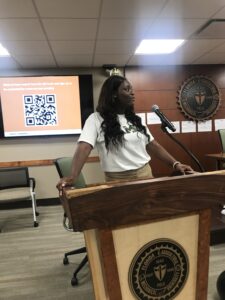
The Teach for America team at FAMU held an event, “The history of educational inequality,” Tuesday in the Student Senate chambers.
One of the inequalities in our educational systems is a drop-out rate of 1.3 million students leaving high school early every year. Half of those students are black and brown.
This was not your typical event. It was interactive and the audience was involved and interested in learning and paying attention to the information.
During one portion of the event people had to stand if the statement on the presentation applied to them, statements such as: “I (or my parents) paid for a tutor to prepare me for the ACT/SAT and I had a strong knowledge of HBCUs before attending Florida A&M University.”
This showed many disparities among the people in the audience and how everyone had a different educational experience growing up. Some students had access to certain materials and opportunities, and others did not.
Taylar Hall, a senior political science major and Teach for America campus ambassador, led the event.
A simple yet powerful activity during the event was called “A walk in time.” A timeline of education in the United States was posted around the room, which showed how public education in America affected people of color.
In the 1830s Southern states had laws forbidding teaching people in slavery to read and write. Policies like this were presented across the room informing the audience of the many inequalities that have been deployed against people of color for hundreds of years.
Teach for America saw it as important to help FAMU students see how they could be useful and beneficial to communities that need representation from educators who look like them.
Teach for America is not a teacher program, it is a leadership development non-profit organization encompassed with a diverse network of leaders who confront the inequality of our education system by teaching two years in an undeserved community. It is looking for college graduates to join its network across the country that serves in a multitude of career fields to create a nation free of this injustice.
“As college students at an HBCU we often settle into a particular lifestyle and forget that there are still black students in our home communities that need us,” Hall said. “I felt it was important to bring this event to campus because many FAMU students are not aware of how education not only disproportionately affects them but their communities as well.”